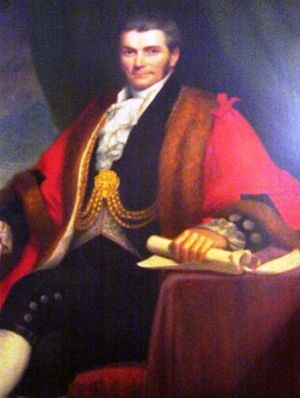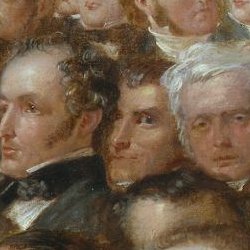Richard Peek facts for kids
Richard Peek (born October 3, 1782, died March 7, 1867) was a successful tea merchant in London. He started from humble beginnings in Loddiswell, a small village in Devon, England. Richard Peek became one of the important Sheriffs of the City of London. He was also known for being an abolitionist, meaning he worked to end slavery. He was also a philanthropist, which means he loved to help others. While he was a sheriff, he even sent someone to help prisoners in Newgate Prison.
Contents
Richard Peek's Early Life
Richard Peek was born on October 3, 1782, at a place called Halsenwood villa, which later became Hazelwood. His parents were John and Susannah Peek. Richard left his hometown of Loddiswell to work for a grocer in Plymouth.
From Humble Beginnings to London
It is said that Richard walked all the way to London. There, he met a Quaker, a member of a religious group, who helped him get a job at a tea merchant company called Sanderson and Barklay. Richard was very good at his job. He did so well that he was promoted. His success also encouraged two of his brothers, William and James, to move from Devon to London and join the tea trade.
Building a Family Business
In 1823, Richard, William, and James Peek started their own company, Peek Bros and Co. William had already started a family business in 1818, which helped them get started. Their business grew a lot, especially after the East India Company lost its special right to be the only company importing tea. Peek Bros and Co. opened offices in Liverpool and continued to be a successful business for many years.
A Public Servant and Reformer
Richard Peek became an important figure in London. He was elected to the Corporation of London, which is like the city government. In 1832, he became one of the Sheriffs of the City of London. This was a very important role.
Helping Prisoners
During his time as Sheriff, Richard Peek cared deeply about prisoners. He paid for a missionary to visit people held in Newgate Prison. He also strongly disliked the death penalty. It is said that he would often meet with the Secretary of State, who was in charge of justice, at unusual hours. He would try to convince the Secretary of State, Robert Peel, to save the lives of people who were sentenced to death.
Retirement from Business
Richard Peek decided to retire from his business partnerships. The partnership in Liverpool ended in 1834. He then retired from the main business in Eastcheap, London, in 1838.
Fighting for a Better World
Richard Peek was a strong supporter of ending slavery. He was part of the group that organized the 1840 World's Anti-Slavery Convention in London. This was a big meeting where people from all over the world came together to talk about how to stop slavery.
Richard Peek was even included in a famous painting of the convention, which is now in the National Portrait Gallery in London. He continued his work against slavery at the second international Anti-Slavery convention in 1843. There, he served as a vice-president and even took charge of the meeting when another leader, Samuel Gurney, had to leave.
Supporting Important Causes
Richard Peek also helped start The Patriot magazine. This magazine played a big part in spreading the message of abolitionism in Britain. He gave money to build a chapel in Dodbrooke, Kingsbridge, for a religious group called the Bible Christians. He also provided free medical help every week in his home village and funded a news and reading room in 1839.
Giving Back to His Community
After retiring, Richard Peek moved back to Loddiswell. He became a magistrate, a type of judge, and was known for his kindness and generosity.
Supporting Education
In 1841, he donated land for a local school. Later, he gave more land to help pay for the school's upkeep. This school, called The British School, was founded in 1853. Records show that Richard Peek often paid the school fees for many early students. He also opened his home once a year to host a tea party for children from local Sunday schools. The building he supported is still the local primary school today.
Later Life and Legacy
Richard Peek passed away on March 7, 1867, in Kingsbridge. He did not have any children. To honor his memory, an alabaster pulpit, a special stand in a church, was paid for and placed in his local church. He was buried in the catacombs, which are underground burial places, beneath his home, Hazelwood.
Members of the Peek family continued to live at Hazelwood, near the River Avon. Some of his family members have even served as High Sheriff of Devon in later years.
 | George Robert Carruthers |
 | Patricia Bath |
 | Jan Ernst Matzeliger |
 | Alexander Miles |



